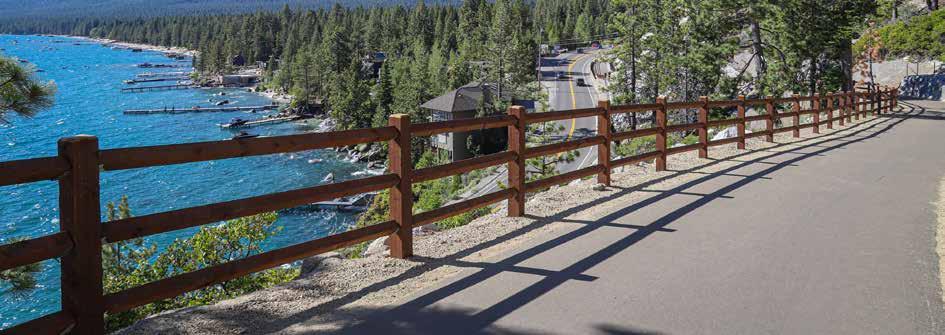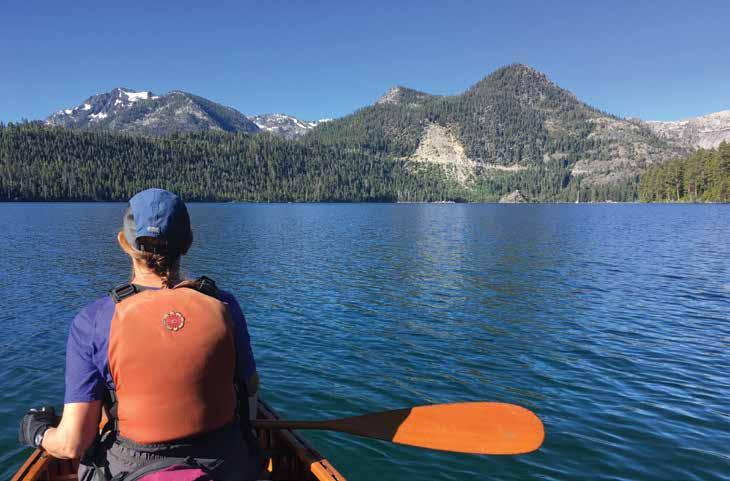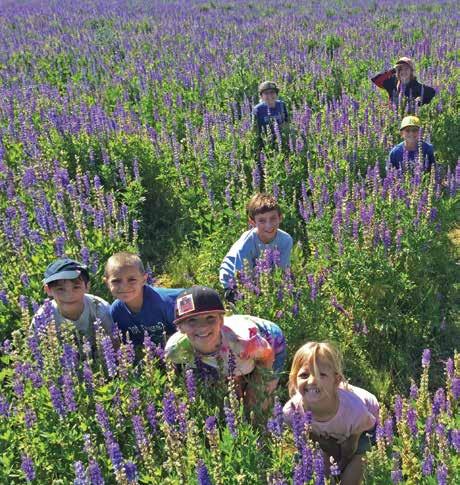
5 minute read
PRESERVE TAHOE’S PRISTINE PARADISE TIPS FOR ENJOYING SUMMER FROM TRASH TO TRAFFIC
BY PRIYA HUTNER
Majestic snowcapped mountains create an incredible backdrop for summertime in Tahoe. Whether you are one of the 15 million annual visitors or are a local, when spending time outdoors, it’s essential to be safe, help keep the outdoor natural playground free from trash and enjoy what Tahoe has to offer.
Advertisement
Tackling traffic
Driving in Tahoe on mountain roads and around Lake Tahoe requires awareness. We have a lot of roundabouts in the region. If unaccustomed to driving in a roundabout (which can be one or two lanes), Rule 1 is do not stop in the middle of a roundabout. One technique is to keep going around in circles until you figure out which exit you need or take any exit and pull over. Stopping is an accident waiting to happen, so is not yielding to cars already in the roundabout. We joke that there are two seasons in Tahoe: winter and construction. If you are driving, bring your patience along for the ride, there is roadwork everywhere, especially after the record-breaking winter we endured.
Slow down
Drive the speed limit and stay focused. There are kids playing everywhere and road biking is a popular activity. Visitors also tend to be awestruck by Tahoe’s beauty and can be easily distracted while driving. Slow down, please, and take a boat cruise or public transportation to take in the sights.
Be bike aware
Tahoe is a biking mecca and cyclists are on the roads day and night. Do not park in any bike lane and look for cyclists coming from behind before opening the car door.
Many places around Lake Tahoe don’t have bike lanes, so share the road. Drivers are required to stay at least 3 feet away from cyclists in California.
Cold water can kill
The snow is melting and lakes and rivers are frigid and running swiftly. Stay out of the river if it is churning fast; that includes keeping your dog out of the river, too.
Children younger than 13 must wear life jackets by law while on a vessel in Nevada and California. That includes standup paddleboards, kayaks, personal watercraft and other craft.
If paddleboarding or kayaking, you are required to carry a life jacket or personal flotation device (PFD). In Lake Tahoe’s cold waters, it is best to wear a PFD, no matter how good a swimmer you are. It can be dangerous if you fall into the water.

When a person falls or jumps into cold, alpine water, the first instinct to gasp in shock – cold water shock. This sets off a chain reaction that often leads to drowning. Life jackets give people a few minutes to control their breathing, calm down and self-rescue.
Go with a qualified guide
Consider hiring a local guide who knows the area for activities on the water or a guided hike or mountain bike ride. However, many people post guide services on social media that we know aren’t licensed or insured, don’t have basic first aid training and don’t carry first aid gear.
Ask these questions before going out with any guide:
• Is your guide licensed and insured?
• Is your guide properly trained? Ask what their training entails when booking.

• Does your boat guide have the required captain’s license?
• Before renting gear or a boat from social media or on the side of the road, ask for their license and insurance. Make sure any boats have the proper 2023 invasive species sticker.
• If you’re on a boat, there should be a safety talk about the location of life jackets. If not, ask where they are.
• Are they trained in first aid and CPR? Do they carry first aid gear? Ask if they don’t tell you.
• If you’re in the backcountry, do they have a sat phone or radio (cell phones don’t work)?
Poop is a problem
Human and dog waste is a problem not only on trails, but at local beaches and parks. Before heading out, be prepared with dog bags and bring a sealed bag when you go out hiking or biking. If you need to relieve yourself in the woods, drip dry or wipe and carry it out in the bag. The same goes for your child’s dirty diapers and your pooch’s poop. Pick it up and pack it out.
Poop in the waterways or on the trails is a problem. If you see a plastic bag of dog poop, feel free to pick it up. Unlike many cities, there is no one to clean up trash or pick up after you. Dog poop is as toxic as insecticides, according to the EPA.
Keep the music down
Renting in Tahoe? Keep the loud music to a minimum. Best tip: rent a silent disco and dance the night away. The neighbors who live here year-round enjoy the peace and quiet and immerse themselves in nature.
The same goes for boating on the lakes; do not have loud, blaring music. It scares off wildlife and ruins other people’s vacation.
Be bear aware
Put trash in the bear-proof box and make sure it’s locked. Lock the house and car doors to keep bears out. Bears are pros at opening doors and breaking into cars, garages and houses. If a bear tries to break into your car or home, call the BEAR League at (530) 525-7297 (24/7). Staffers will come and assist you.
Sun, altitude safety
You can become easily sunburned at altitude, especially if you’re on the water, which reflects the sun. Wear a hat and sunscreen and drink lots of water. If you’re not accustomed to hiking at altitude, take a few days to acclimate before tackling a long hike.
Sole security
Good walking and hiking shoes are essential in Tahoe. Shoes with heels and flipflops are terrible to hike in. Expect gashed toes and broken ankles if you head out in flip-flops. Bring a good pair of walking shoes for sightseeing and hiking shoes with ankle support when venturing out on a trail.
Show your appreciation
Dining out in Tahoe? So is everyone else. Make a reservation in advance, even for lunch, and prepare to wait if you don’t. Grab a cocktail and relax. Housing storages still abound in the region, so please tip your server and your guide 18 to 20 percent. Their livelihood depends on tips.
Katherine E. Hill contributed to this feature.
Paved Path Pointers
• Keep dogs leashed
• Do not spread out across the trail.
• Pedestrians must yield to bikes.
• Don’t stop on the trail; move to the side.
• Cyclists should call out when passing pedestrians.
• Cyclists pass on the left.
• Kids younger than 18 are required to wear a helmet while biking.
Trail Etiquette
• Mountain bikers must yield to hikers and equestrians.
• Hikers must yield to equestrians.
• Uphill mountain bikers have right of way over downhill bikers.
Leave No Trace
• Plan ahead and prepare
• Travel and camp on durable surfaces
• Dispose of waste properly
• Leave what you find
• Minimize campfire impacts
• Respect wildlife
• Be considerate of other visitors









